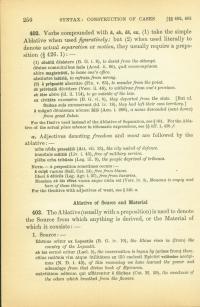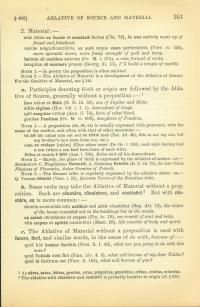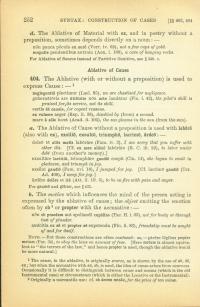403. The ablative (usually with a preposition) is used to denote the source from which anything is derived, or the Material of which it consists.
- Source:
Rhēnus oritur ex Lepontiīs. (B. G. 4.10)
The Rhine rises in (from) the country of the Lepontii.Ab hīs sermō oritur. (Lael. 5)
The conversation is begun by (arises from) them.Cûius ratiōnis vim atque ūtilitātem ex illō caelestī Epicūrī volūmine accēpimus (N. D. 1.43)
We have learned the power and advantage of this reasoning from that divine book of Epicurus.suāvitātem odōrum quī afflārentur ē flōribus (Cat. M. 59)
the sweetness of the odors which breathed from the flowers - Material:
Erat tōtus ex fraude et mendāciō factus. (Clu. 72)
He was entirely made up of fraud and falsehood.valvās māgnificentiōrēs, ex aurō atque ebore perfectiōrēs (Verr. 4.124)
more splendid doors, more finely wrought of gold and ivoryfactum dē cautibus antrum (Ov. M. 1.575)
a cave formed of rocksTemplum dē marmore pōnam. (Georg. 3.13)
I'll build a temple of marble.Note 1— In poetry the preposition is often omitted.
Note 2— The Ablative of Material is a development of the Ablative of Source. For the Genitive of Material, see § 344.
a. Participles denoting birth or origin are followed by the Ablative of Source, generally without a preposition.1
Iove nātus et Mâiā (N. D. 3.56)
son of Jupiter and Maia
ēdite rēgibus (Hor. Od. 1.1.1)
descendant of kings
quō sanguine crētus (Aen. 2.74)
born of what blood
genitae Pandīone (Ov. M. 6.666)
daughters of Pandion
Note 1— A preposition (ab, dē, ex) is usually expressed with pronouns, with the name of the mother, and often with that of other ancestors.
Ex mē hīc nātus nōn est sed ex frātre meō (Ter. Ad. 40)
This is not my son, but my brother's
(not born from me, etc.)
cum ex utrāque [uxōre] fīlius nātus esset (De Or. 1.183)
each wife having had a son
(when a son had been born of each wife)
Bēlus et omnēs ā Bēlō (Aen. 1.730)
Belus and all his descendants.
Note 2— Rarely, the place of birth is expressed by the Ablative of Source.
Dēsīderāvit C. Flegīnātem Placentiā, A. Grānium Puteolīs. (B. C. 3.71)
He lost Caius Fleginas of Placentia, Aulus Granius of Puteoli.
Note 3— The Roman tribe is regularly expressed by the Ablative alone.
Q. Verrem Rōmiliā (Verr. 1.23)
Quintus Verres of the Romilian tribe
b. Some verbs may take the Ablative of Material without a preposition. Such are cōnstāre, cōnsistere, and continērī.2 But with cōnstāre, ex is more common.
Domūs amoenitās nōn aedificiō sed silvā cōnstābat. (Nep. Att. 13)
The charm of the house consisted not in the buildings but in the woods.
Ex animō cōnstāmus et corpore (Fin. 4.19)
We consist of soul and body.
Vīta corpore et spīritū continētur. (Marc. 28)
Life consists of body and spirit.
c. The Ablative of Material without a preposition is used with facere, fierī, and similar words, in the sense of do with, become of.
Quid hōc homine faciātis? (Verr. 2.1.42)
What are you going to do with this man?
Quid Tulliolā meā fīet? (Fam. 14.4.3)
What will become of my dear Tullia?
Quid tē futūrum est? (Verr. 2.155)
What will become of you?
d. The Ablative of Material with ex, and in poetry without a preposition, sometimes depends directly on a noun.
nōn pauca pōcula ex aurō (Verr. 4.62)
not a few cups of gold.
scopulīs pendentibus antrum(Aen. 1.166)
a cave of hanging rocks.
For Ablative of Source instead of Partitive Genitive, see § 346.c.



